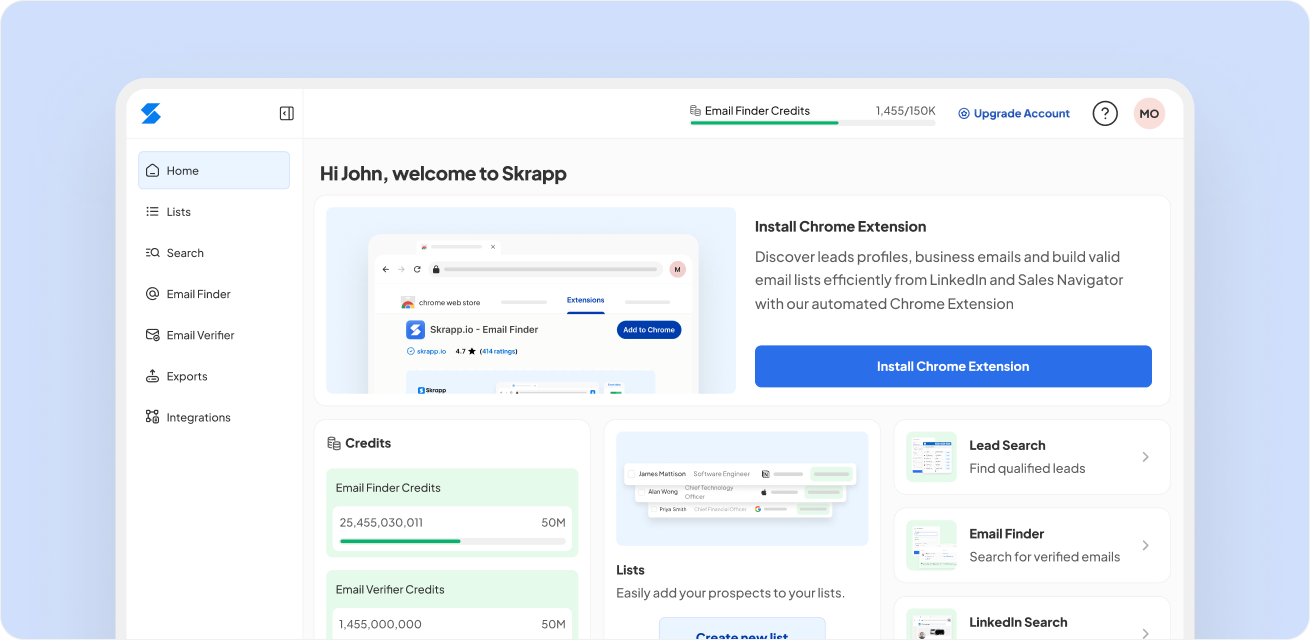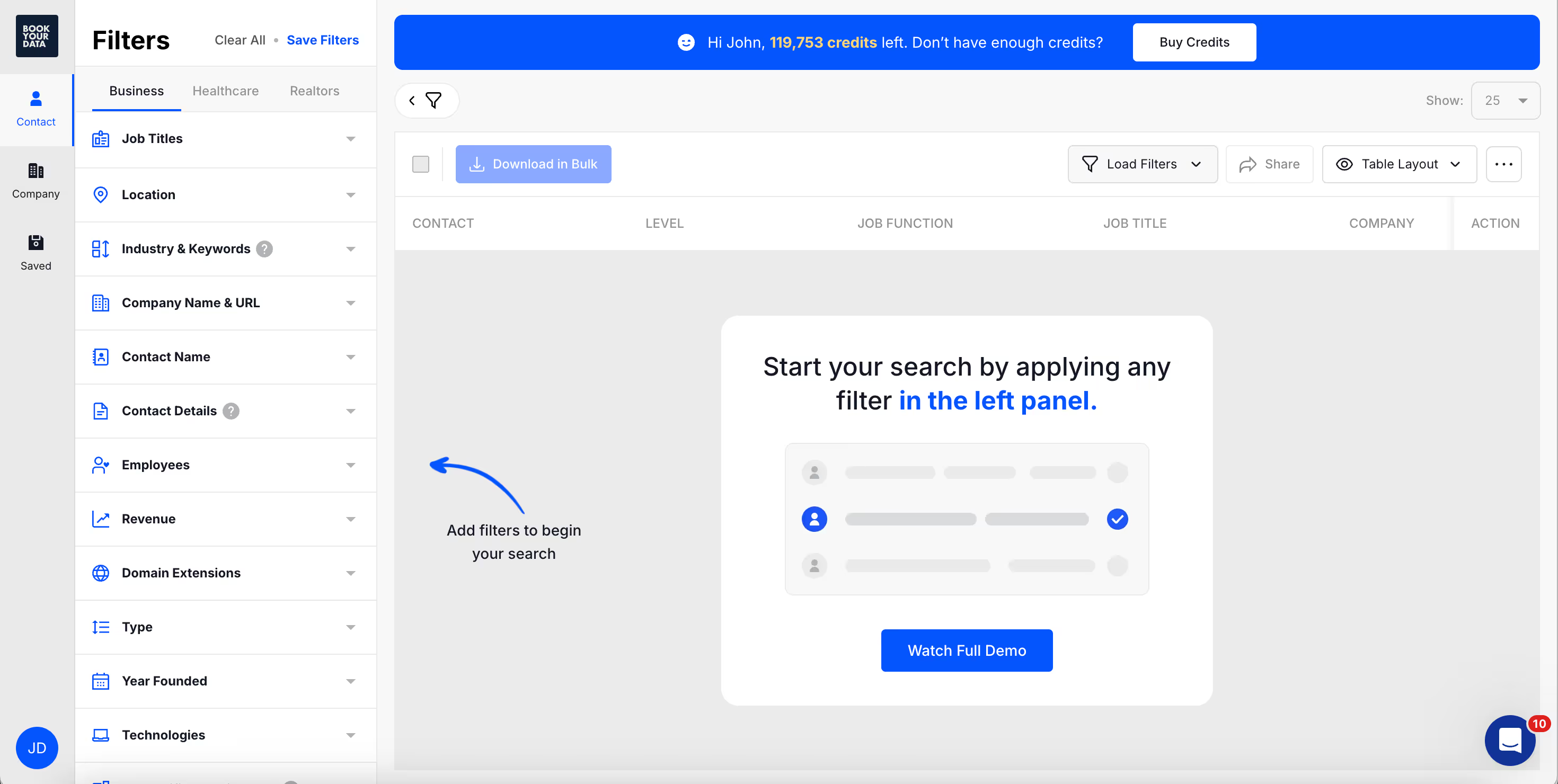As an agency, you are probably aware that selling your SEO services isn't exactly easy. There is a lot of competition, and you are probably always looking for customers.
One effective way to find potential customers is by purchasing SEO leads from reputable websites.
These are people who have already shown interest in your services and just need a little nudge to become paying customers.
We searched for some of the best websites to buy authentic and reliable SEO leads.
What is an SEO lead provider?
SEO lead providers gather and sell the contact details of company executives who have shown interest in purchasing SEO services. In short, they provide a ready-made list of potential customers that you can turn into paying clients.
Lead providers take the hassle of generating SEO leads off your hands, so you can focus on simply pitching your services to prospective clients.
Doing so ensures your sales pipeline never runs dry while also cutting down on marketing costs.
This can reduce your dependency on lead generation campaigns.
How to buy SEO leads
Purchasing leads is not as simple as it appears on the surface. You need to research reputable platforms, figure out what you need, and decide which lead provider best meets your needs.
Ensure that you've done your own SEO and have a custom pitch deck in place to increase the effectiveness of converting the leads you purchase.
Here are 3 steps to buying SEO leads.
Verify the provider’s credibility
Do your research on the lead provider before you enter your credit card information, and get ready to spend a lot of money on SEO leads. Many lead websites aren't reliable, and working with them will be a waste of time, money, and resources.
The website of the lead providers' lead providers is a good place to start, but these testimonials might not always be accurate because the seller picks and chooses which ones to use.
Instead, look for reviews on independent platforms like G2, Capterra, and Trustpilot.
Going over the reviews and comments here will give you a general idea of what to expect when you work with a lead provider in the SEO industry.
If you have specific questions, industry forums are very helpful. You may also find some information on Reddit and Quora.
Make a post on relevant subreddits to connect with others who regularly purchase leads.
- r/DigitalMarketing
- r/marketing
- r/Entrepreneur
Define what a lead is
It's a good idea to make a mental note of what customer type you're after and how you determine what a qualifying lead is. This way, you won't be talked into a plan that doesn't fit your real needs.
Ask yourself a few questions before proceeding, starting with whether you're targeting a specific industry, designation or product.
If your SEO company has experience working in a specific niche, it may be preferable to target clients in that industry. This can increase your chances of receiving a response.
But that also means you'll need to check out lead platforms carefully to see if they have enough leads in your desired niche.
Determine whether you need details on specific roles within that industry.
For example, if you specialize in the health technology industry, not all contacts within it will yield results. You need a decision maker higher up in the hierarchy.
If you have someone specific in mind, like a director or CMO, ensure that the lead seller has their information on file.
Remember that you're using a lead broker means you won't find exclusive leads.
And finally, add up how much you think it will cost you to buy leads and compare it to how much it will cost you to generate them yourself.
Although purchasing will almost always be the more wallet-friendly of the two, it doesn't hurt to keep your budget in check.
Compare plans
Don't just settle for the first lead provider you come across. Examine the plan carefully and compare it to other lead generation services to see which one gives you the most for your money. Here are some factors we recommend keeping an eye out for:
Pricing: Take a look at the different packages offered by various lead providers to get an idea of what the average market price is. You can go with a lead provider who charges more but has other features you like, but we recommend testing a sample or starting off on a basic plan first.
Those below market price are usually hit-or-miss in terms of lead quality and relevance.
Quality: If the lead provider offers sample leads, you can use these to determine lead quality and relevance. Again, if the leads are of poor quality and don't match your criteria, move on to another platform.
While some lead sellers provide a lead score, you'll have to do the heavy lifting for others yourself. Your lead provider should include an email verification tool, or you can use external tools.
Verifying contact emails can help ensure that you are closer to getting quality leads.
Relevance: Perform a few test runs on the lead platform using your desired filters to see if the results fit your target market. For instance, if your filters included health tech startups but the results included details from a different industry, the leads are irrelevant and you should avoid the platform.
Reviews and Social Proof: Compare the reviews of different platforms to determine which have received higher ratings for lead quality and customer satisfaction. We recommend going for lead sellers that have an average rating of at least 4.5 stars or 4 stars if they have a large number of reviews.
10 websites to buy SEO leads
While you can use the criteria mentioned to find platforms that sell SEO leads, here's a summary to find qualified SEO leads.
We've reviewed them so picking from this list should get you started with enough potential clients to pitch your SEO proposal.
Here are 10 lead generation platforms to buy SEO leads:
1. UpLead

Capterra Rating: 4.7/5
UpLead is another big name among digital marketing experts. They guarantee a 95% accuracy rate for leads generated, which is a pretty error-free number as far as leads go.
You don't just get the prospect's email either; UpLead gives you access to their whole profile, including their social media accounts and phone number in some cases.
But their browser extension is what really sells the product.
It allows you to pull contact information directly from the website of a company. This is a great way to get leads while researching.
2. Skrapp

Capterra Rating: 4.6/5
Skrapp is a LinkedIn email finder that does two things differently from most tools. First, unlike most tools, your credits don't expire every month.
Second, you only pay for emails that are valid. Skrapp charges you for verified emails marked as "Valid" or "Catch-all". Their verification accuracy is above 97%, so most emails you pull will be deliverable.
The Chrome extension can help you extract email addresses from LinkedIn profiles and search results without switching between tabs. And they claim an email search success rate of 92%, which means you'll find working contact information for most profiles you check.
While Skrapp pulls emails from LinkedIn profiles, its Auto Connect and Follow feature can send connection requests and follow people automatically. This way, you're building your network while collecting leads at the same time.
If you're an agency running multiple campaigns or building several lists simultaneously, Skrapp handles up to 2,500 emails per operation at 25 profiles per second so you're not waiting around for data to populate.
The tool integrates with HubSpot, Salesforce, Pipedrive, and Zoho CRM so you can push leads straight into your sales pipeline without having to manually export and upload CSV files. Skrapp estimates that a single integration saves the average user around 8 hours per week just on data transfer tasks.
3. Apollo

Capterra Rating: 4.6/5
Apollo is one of the biggest names out there for finding SEO leads in a range of industries. They boast more than 250 million contacts. You'll be hard-pressed to find a list of contacts this expansive among competitors.
You can look for prospects using a number of reliable filters, including industry, location, company size, and specific keywords.
Apollo makes acquiring SEO clients from highly-targeted leads a breeze once you've mastered the tool's functionality.
4. Bookyourdata

Capterra Rating: 5/5
Bookyourdata delivers verified B2B email leads with an accuracy-first approach designed for growth-focused agencies. What differentiates the platform is its combination of a 97% accuracy guarantee, real-time email verification, and an industry-unique pay-as-you-go model, allowing buyers to download only the contacts they need.
Bookyourdata ensures each contact is relevant and compliant instead of locking users into monthly plans or outdated databases. Filtering options include industries, job titles, regions, and company size, giving SEO providers control over their targeting.
For agencies that prioritize clean data and budget flexibility without compromising on quality, Bookyourdata offers a practical, high-trust alternative in a saturated space.
5. LinkedIn Sales Navigator

Capterra Rating: 4.5/5
The Sales Navigator is a LinkedIn-offered product for anyone looking to build lead lists. The unique advantage this tool has over others is its integration with LinkedIn, making it easier to use Sales Navigator data in third party tools for streamlined lead management.
This means that the contact details and other information about leads are directly taken from the user's profile, which is kept updated by the users themselves.
This allows you to access more exclusive SEO leads and reduces the risk of being stuck with a batch of irrelevant contacts that yield no results.
With other tools, you may have to buy separate paid tools to check if the lead data is viable. Plus, you can track changes a user makes to their profile by marking them as a priority account for your SEO business.
6. BuiltWith

Capterra Rating: 4.2/5
BuiltWith is not like your usual lead generation platform.
Instead of searching for contact information of leads within a company, you search for companies based on which technologies they're using.
This can be incredibly lucrative for SEO agencies in specific niches and specializations. Rather than sending a generic email to a potential client, you can make your efforts more personalized.
For example, if you notice a prospect using a certain tool or CMS platform, you can mention the information in your email and explain how you can help improve their search engine optimization efforts.
This can improve your chances of standing out and converting them to SEO clients.
7. Lusha

Capterra Rating: 4/5
While a newer entrant as compared to some of the other options on the list, when it comes to functionality, Lusha doesn't disappoint.
They allow integration with Salesforce, HubSpot, and a number of other tools for convenience, plus an API enrichment feature that allows you to improve any existing lead lists.
Data collection methods used by Lusha involve a mixture of crowdfunding and the use of AI to search the web for information.
While not foolproof, you can use Lusha to find SEO leads with reliable information.
8. Hunter.io

Capterra Rating: 4.6/5
Hunter.io is an email-finding tool and a great option if your SEO agency has already taken the first step toward your online marketing strategy by identifying which companies you want to target.
However, since the platform doesn't provide the option to search for companies based on keywords or other criteria, you wouldn't have much luck generating leads from scratch.
If you have a company in mind, you can simply enter its URL within Hunter.io to get a list of email addresses associated with employees at the said business.
9. RocketReach

Capterra Rating: 4.2/5
RocketReach boasts a database of over 700 million contacts, the largest by far among competitors mentioned on the list.
Functionality-wise, it has all the essentials you would need in an SEO lead generation platform. A comprehensive list of filters, integration with workflows, and a Chrome extension to get SEO lead details directly on LinkedIn.
10. ZoomInfo

Capterra Rating: 4.2/5
ZoomInfo is a big name among social media marketing experts.
And with good reason. The tool has been around for a long time, and its data is said to be among the most complete.
You can search for prospects using the usual filters like industry, company size and location. Save your lead lists and opt-in to be notified of any updates to them in the future.
We did find that ZoonInfo is good for agencies looking for contacts in larger companies.
While the contact information is usually error-free, the platform sometimes struggles to identify the true number of employees a company has.
This can be disappointing because most people in the SEO industry want to use the company size filter. However, if you have the wrong information about these, they can eat up your credits and leave you with no return on investment.
11. GetProspect

Capterra Rating: 4.4/5
GetProspect is a cloud-based email extraction and lead generation tool designed to assist sales teams and marketers in finding accurate B2B contact and company data.
Users can search for valid emails of their ideal customers based on job title, location, industry, company size, and other filters.
Additionally, they can extract emails and profiles from LinkedIn in bulk using the Chrome extension. GetProspect also provides access to a B2B database with over 200 million up-to-date contacts.
However, the tool's Chrome extension sometimes does not find as many valid emails.
Conclusion
As an agency, keeping your pipeline of SEO leads full can be crucial to the growth of your business. While you should conduct lead generation campaigns to find exclusive leads, it's useful to sign up with one of these lead providers for access to other companies.
Having this data can make cold outreach easier and fuel your client acquisition strategy. Just be sure to get started with a sample, or basic plan before you splurge the cash!





